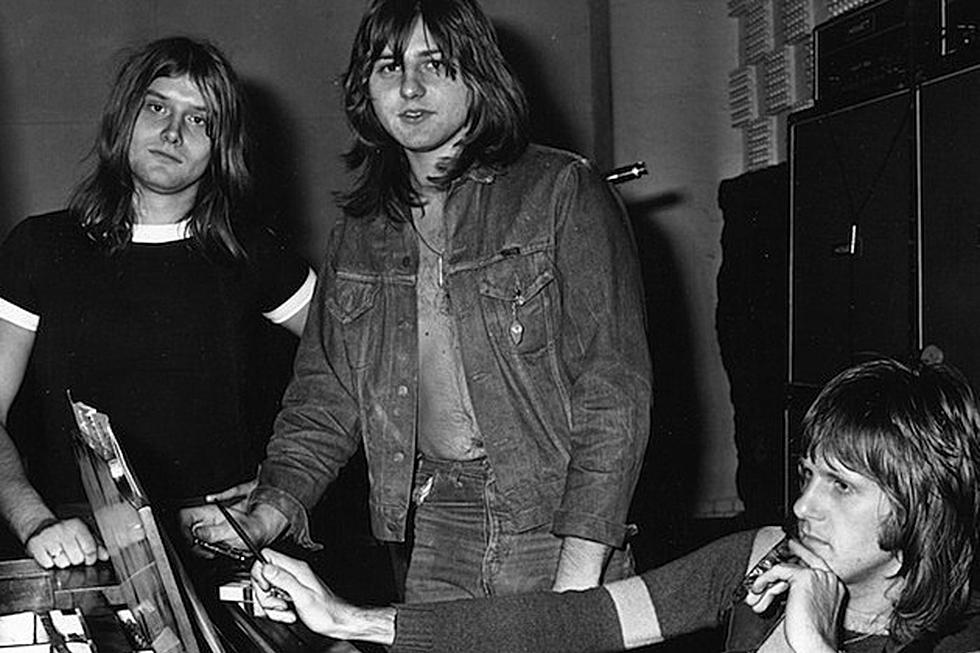
50 Years Ago: Emerson, Lake and Palmer Put It All Together on ‘Trilogy’
Emerson, Lake & Palmer's Trilogy emerged from a period of recapitulation, like the classical music that informed so much of their work.
They'd explored long-form composition on 1971's Tarkus, and were ready to return to the creative process from the band's 1970 debut album. That made going right back to the studio after finishing the Tarkus tour a streamlined experience.
But ELP hadn't given up on their storied indulgences.
They arrived on tour dates in support of this third studio LP with 200 pieces of equipment, which U.S. Customs valued at about $700,000 using modern-day exchange rates. Keith Emerson's 13 keyboard units included a sexy brand-new Moog prototype. There was also a Persian rug – reportedly valued at around $35,000 these days – for Greg Lake to stand on while playing bass.
No surprise then that Emerson, Lake & Palmer became the subject of lots of jokes. Example: How does ELP change a light bulb? They don't. Drummer Carl Palmer's karate instructor holds the bulb while 63 roadies turn the lighting rig.
"We represented total excess," Emerson later admitted to the Los Angeles Times. "We were up for ridicule."
Listen to ELP's 'From the Beginning'
Still, there was at least one price ELP would not pay. Trilogy was set to arrive on July 6, 1972, with a cover illustration by the famed artist Salvador Dali. He requested $350,000 at today's exchange rates, however, and was promptly turned down.
Instead, Emerson, Lake & Palmer poured everything they could into studio work on the heavily overdubbed Trilogy, harnessing the studio to meet their larger goals. "It was a hard album to make because it was a very accurate album. A lot of time went into it – a lot of care," Lake told Hit Parader in 1974. "In many ways, it's one of the best albums we've done."
The band got there by following its first-album pattern: Included among ELP's sturdy original prog fare were a classical reinterpretation, a delicate acoustic track by Lake and some kind of a goof.
The best-known song – and highest-charting single – from Trilogy would be Lake's introspective "From the Beginning," in an echo of their earlier international hit "Lucky Man." "Although very young at the time, I sometimes had moments of reflection and maybe also perhaps a feeling that I could be a better person," Lake later said. "I think this was just one of those."
Elsewhere, "Hoedown" was adapted from a portion of Aaron Copland's Rodeo. "I can spend three or four months working on my own music and after this, it is kind of a break – a refreshing change – to play something like 'Hoedown,' which incidentally is a lot of fun," Emerson told The New York Times in 1973.
Listen to ELP's 'The Endless Enigma'
Asked about the larger implications of blending their songs with reworkings of classical pieces, Emerson added: "I suppose if you're looking for a description of what ELP is about, it's progressive rock with a lot of regard for the past."
They weren't beholden to it, though. Emerson, Lake & Palmer's comedic turn on "The Sheriff" became another in a long line of songs that ran counter to the prog genre's overly stiff demeanor.
"At the time, mainly, what they were was Keith Emerson doing this sort of honky-tonk bar piano," Lake said in 2012. "He does a lot of those interpretations, and some of them are good. Sometimes, he'll come up with one that's really nice – and those were the things that were too good to pass by, really."
Trilogy was completed with strict meticulousness over the first few months of 1972. Detailed use of multitrack technology allowed Emerson to add exotica like the zurna, a reed instrument that he bought in Tunisia. But at the same time, they left in a slight mistake on "The Sheriff" by Palmer – who then can be heard exclaiming, "Shit!" The design firm Hipnosis added the finishing touch with an illustration that portrayed Emerson, Lake & Palmer on an album cover for the very first time.
Taken together, the results were definitive. "That's when the band really secured its own identity," Lake told Mike Mettler in 2016. "Technology was moving forward at an astounding pace as we made that record. The whole thing came together in one recording."
Top 50 Progressive Rock Albums
Why ELP Hated One of Their Albums





